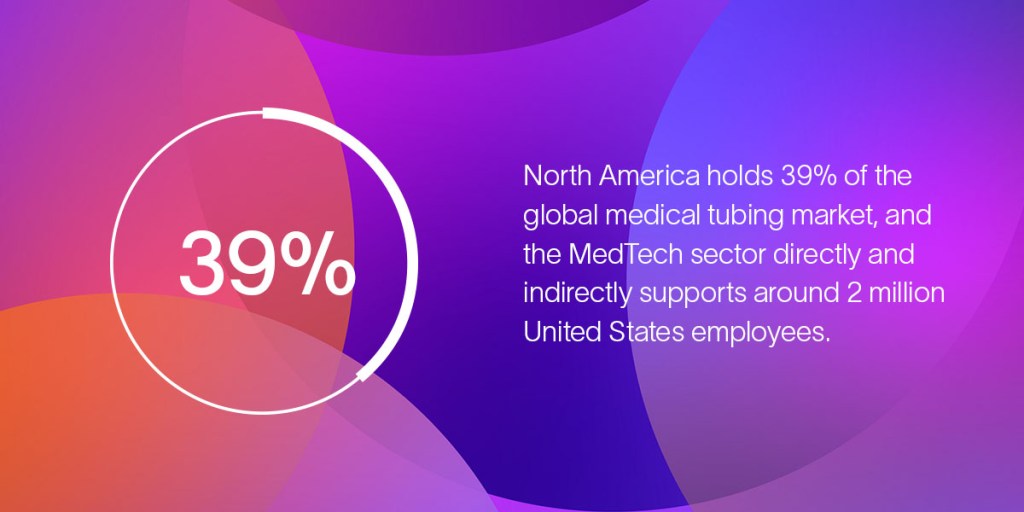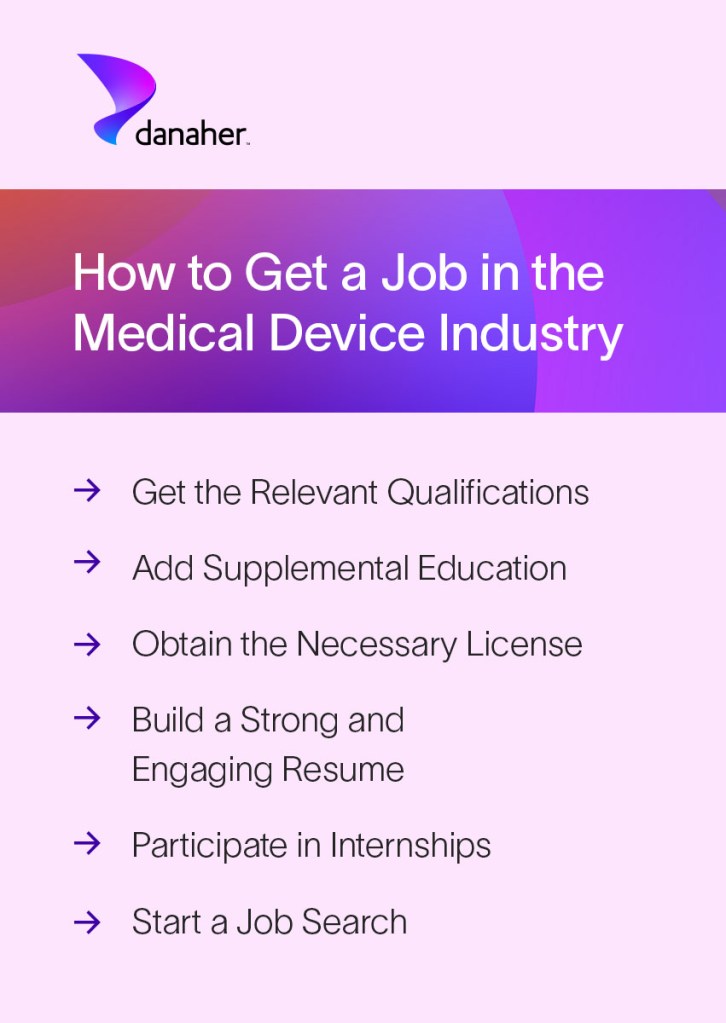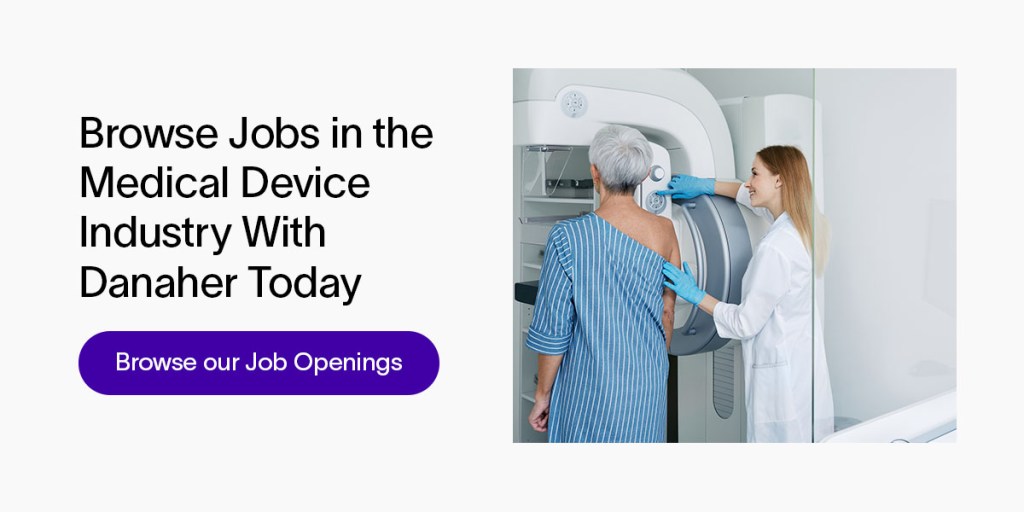
Whether looking to change careers or embarking on a first career journey, the growth of the medical device industry makes it an attractive career option for many. It’s a dynamic field with almost limitless potential for those with technical minds, communications skills and a desire to innovate. From design and engineering to manufacturing and sales, medical device professionals help pioneer new technologies and ensure people get quality patient care.
People passionate about innovation and making a meaningful difference will likely thrive in one of many options under the medical device umbrella. Knowing what jobs there are in the medical device industry makes an excellent first step for ambitious professionals looking to find their niche and begin a successful and rewarding career.
Table of Contents
Understanding a Career in the Medical Device Industry
A medical device career involves playing a critical role in many people’s lives, addressing people’s health needs, delivering innovative and life-changing therapies, and conducting research to discover new treatment avenues and improve patient outcomes. Working in the medical devices industry provides an opportunity to make a meaningful difference, whether working with surgical devices, robotics, imaging equipment or diagnostic tools.
Medical devices is an exciting field characterized by rapid innovation and a chance to stay at the forefront of groundbreaking health care developments. Those with careers in this field work on cutting-edge projects, pioneering breakthroughs that could revolutionize health and wellness. Many job opportunities exist for candidates to ignite their passions and make a difference in the medical device field.
The Career Outlook and Growth of the Medical Device Industry

Careers in the medical device industry offer significant job stability and security. Health care systems worldwide constantly seek technological advancements and innovations to improve patient care, leading to a projected market size of $799.67 billion by 2030. North America holds 39% of the global medical tubing market, and the MedTech sector directly and indirectly supports around 2 million United States employees.
An aging American population puts additional pressure on the overall market. Health care facilities leverage every technology to boost efficiency and manage expenses. As a result, medical device professionals can likely enjoy a steady demand for their expertise.
11 Medical Device Career Opportunities to Consider
The medical device career path is varied and exciting. Anyone looking to start or further their career in this field has many options, from entry-level medical device jobs onward. Only some jobs in the medical device industry require candidates to work in health care. Many skilled professionals design and construct all aspects of medical devices, from ideation through to sales and customer service.
The career offers such variety that candidates can work in several environments, from laboratories to sales offices. Remote medical device jobs can also be an option in certain circumstances. The following positions exist, depending on a candidate’s unique skills and passions.
1. Quality Assurance Technician
A quality assurance technician ensures that products meet design specifications before reaching customers. The career often begins within the quality control department of an organization, inspecting and approving manufactured items. Quality assurance technicians who work with medical devices must be detail-oriented to ensure the devices function correctly in a medical setting.
2. Medical Device Engineer
Medical engineering could be an excellent career choice for those who love solving complex challenges. A medical device engineer often begins their career with a biomedical engineering degree or higher education qualification. They then work with pharmaceutical and health care organizations and can specialize in several areas, including software, imaging, research and many more.
3. Validation Technician
Validation technicians specialize in testing machinery, systems and equipment to ensure every device delivers the same experience to every user. They play a significant role in manufacturing, particularly in health care settings where each device must perform and provide the necessary results for patients. Many validation technicians have undergraduate science or engineering degrees and move on to a master’s qualification in their career paths.
4. Manufacturing Engineer
Manufacturing engineers oversee the design and production of products from within a manufacturing facility. They’re responsible for several aspects of the manufacturing process, such as sourcing high-quality materials and maintaining production quality. These individuals actively innovate cutting-edge medical equipment, producing the highest-quality products while maintaining production efficiency and lowering costs.
5. Radiation Therapist
Although radiation therapists are not medical doctors, they work alongside medical professionals to treat cancer and other diseases with concentrated doses of radiation. They often work as part of oncology teams, operating the machinery and interpreting the data the machines provide. Radiation therapy makes an excellent career choice for people who want to work directly with patients and use their technical skills to improve outcomes.
6. Medical Device Sales Representative

Sales representatives connect medical professionals with their organization’s products, allowing them to access the latest technology and improve patient care. These individuals often have a background in medicine or biology and help with responsibilities like client outreach and after-sale support. They work directly with medical facilities, selling their organization’s devices, fostering strong relationships and listening to feedback.
7. Ultrasound Technician
Ultrasound technicians also interact directly with patients. These medical professionals use ultrasonic sound waves to monitor pregnancies and diagnose patients. They also interpret results, work alongside doctors and maintain ultrasound equipment.
8. Field Engineer
Field engineers work on-site at various locations to perform diagnostics and repairs on medical equipment and ensure they operate to the highest quality standards. They must have well-developed technical, problem-solving and communication skills to install, maintain and repair the equipment their organization provides.
9. Research and Development Engineer
A research and development engineer creates innovative designs by researching various materials and manufacturing processes and working with design teams to innovate and solve complex health care industry challenges. They also work alongside doctors to design or improve diagnostic equipment such as magnetic resonance imaging (MRI) machines and X-rays.
10. Software Engineer
Modern medical devices can only function with high-level software — that’s where software engineers come in. These professional programmers create the software that operates medical devices, writing the code and guiding health care professionals through their operation. They also help maintain and repair medical devices, handle errors, and ensure frictionless upgrades.
11. Quality Control Inspector
Quality control inspectors ensure the safety and functionality of medical devices while also checking they meet specific standards and specifications. They also take care of the testing process after manufacturing. They have sound knowledge of how medical professionals use the devices to diagnose or treat patients.
Skills Candidates Need to Advance Their Medical Device Careers
Whether starting a career or looking to change their career path, candidates must cultivate a specific skill set to advance in any medical device profession. As with any rapidly evolving career, adopting a continuous learning mindset helps employees stay ahead of industry trends and make a meaningful impact. Some advantageous skills in a medical device career include:
- Understanding regulatory requirements: Medical devices must meet stringent regulatory standards and guidelines before they reach the end user. Working in a medical device career requires a thorough understanding of these frameworks and consistent research to stay on top of any changes. If their organization works nationally or internationally, they must learn additional frameworks.
- Practicing risk management: The medical device industry is complex. Every piece of equipment must meet the highest possible standards. Skills like risk management and problem-solving help protect manufacturers and patients. The first line of defense against the fallout of product malfunctions or failures involves knowing what to do when a problem arises.
- Developing problem-solving skills: Medical device professionals must have strong analytical and problem-solving skills. Medical equipment faces frequent scrutiny, and regulatory requirements constantly evolve. As challenges arise, these individuals must be able to address them.
- Focusing on effective communication: Communication plays as important of a role as technical skills in the medical equipment profession. Medical device professionals work in a team, from research and development teams and manufacturers to stakeholders, regulatory bodies and end users. They must be able to communicate and collaborate to ensure positive long-term relationships and uphold the highest standards in patient care.
- Cultivating technical expertise: Medical devices are intricate machines, and anyone who works with them must possess strong technical and engineering expertise. Biotechnology and pharmaceutical skills are also in high demand. As medical device technologies converge, demand increases for people with nanotechnology, informatics and bioprocessing expertise.
How to Get a Job in the Medical Device Industry
Because of the medical device industry’s competitive and ever-changing nature, anyone looking to enter or change career paths should have a sound strategy to ensure they can realize their full potential and attain their career goals. The following steps can help launch a successful medical device career.
1. Get the Relevant Qualifications
The first step to a successful medical device career involves obtaining the relevant qualifications. Depending on their career aspirations, candidates can choose from several qualifications, including:
- Diploma: A diploma in medical lab technology (DMLT) makes an excellent starting point for candidates unable to enter a degree program. These certificate courses teach the basic technical skills unique to the health care industry.
- Bachelor’s degree: Depending on the individual’s job aspirations, they can choose from many relevant bachelor’s qualifications, including engineering, Bachelor of Science (BSc) and pharmaceutical qualifications with specializations in medical technology. Some universities also offer medical technology courses.
- Post-graduate degree: Many students boost their careers with further studies after completing a bachelor’s degree, particularly if they want to focus on the engineering and design elements of medical devices.

2. Add Supplemental Education
Short courses and additional qualifications can be helpful when navigating a new career path. Six Sigma and other lean manufacturing courses in medical devices can bolster a candidate’s resume. Since one of the primary responsibilities of many medical device professionals involves streamlining business processes and reducing costs, these qualifications can make a considerable difference.
Whichever niche career a candidate works toward, online courses and other supplemental qualifications demonstrate a willingness to learn and grow — always important to potential employers.
3. Obtain the Necessary License
Some medical device jobs require candidates to have a license and formal qualifications. Even if these licenses are not a legal requirement, many employers prefer them, so there’s a distinct advantage to obtaining them. A specialized license shows the candidate has additional knowledge and demonstrates a willingness to work for extra credentials. For example, many medical services engineers choose to pursue the National Council of Examiners for Engineering and Surveying professional licensed engineer (PE) license.
4. Build a Strong and Engaging Resume
A resume serves as the first connection candidates have with potential employers. Candidates should always keep their resumes sleek, concise and updated. Resumes offer an excellent opportunity to highlight a candidate’s accomplishments and personality traits and show potential employers they have the requisite skills and fit the organization’s culture.
Cover letters also play a role in a successful application. A cover letter condenses a candidate’s qualifications and experience, making it easier for potential employers to see how their goals, skills and interests connect with the position. Cover letters present an opportunity to tell potential employers the “why” behind the resume and explain what motivates them to succeed in a career in the medical devices industry.
5. Participate in Internships
While qualifications are critical in a complex industry like medical devices, hands-on experience is as important. Participating in internships presents a fantastic opportunity for potential medical device professionals to develop their skills, build their resumes and make industry connections. Candidates can start the process by contacting their ideal companies, discussing internship opportunities, handing over their resumes and highlighting their achievements.
6. Start a Job Search
Once candidates have everything they need, they can apply for medical device jobs. Many organizations advertise their available positions online, so online browsing is often a good place to start. Working with recruiters can also help recruiters reach the right people and expedite the application process.
Candidates should search for jobs that match their passions and personal interests. Ideally, candidates should meet with recruiters to ensure their goals are aligned. Candidates are also more likely to have productive relationships with a recruiter with industry experience, as these organizations have relationships with industry professionals.
Tips and Tricks for a Successful Career in the Medical Device Industry
As the health care industry evolves, even the most experienced medical device professionals must take positive steps to advance their careers. Some tips and tricks for ongoing career success include the following.
Set Achievable Goals
From the outset, candidates should envision their career goals. They should also have a thorough and honest understanding of their skills and interests so that they can focus their efforts on the most fulfilling career path. As a niche industry, researching different job options and their requirements can help candidates narrow down focus areas.
Potential medical device professionals can also use metrics to measure career successes as they progress, including customer or manager feedback, response rates and revenue generation. Creating a career roadmap helps keep candidates on track and aligned with their long-term objectives.
Foster Strong Industry Connections
Solid relationships create the backbone of many successful careers — a medical device career is no different. Industry professionals should focus on creating lasting connections with customers, partners, managers and colleagues. Over time, these positive relationships build trust and provide medical device professionals with the resources and opportunities to advance their careers.
Keep up With Industry Changes
The MedTech industry evolves daily. Career professionals must keep up with the latest innovations and trends to push boundaries and pioneer new solutions. Investing in ongoing learning is the best way to stay relevant, from attending courses and seminars to having updated licenses.

Browse Jobs in the Medical Device Industry With Danaher Today
Building a career with limitless opportunities starts with the proper organization. At Danaher, we’re dedicated to helping people develop their talents and grow their knowledge to make a real-world impact. We believe in supporting candidates through each step of the job search process, from securing internships to developing long-term careers.
Through our groundbreaking work in biotechnology, life sciences, diagnostics and multiple other fields, we’ve created exciting job and internship opportunities to help others flourish in these fields. If you’re ready to make a positive change, browse our job openings and accelerate your career with Danaher today.

Leave a Reply